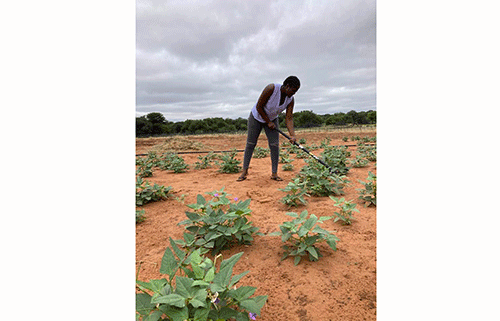It all started as an experimental crop farming project. The location – the village of Epata in the Otjinene constituency – seemed ideal for a crop farming venture.
This is where Joyce Muzengua decided to plant her first agribusiness seed. She planted it all – melons, pumpkin, carrots, onions and the sort.
She hoped that the seed would bring life to a formidable and fully-fledged vegetable undertaking. It was not to be – all her seeds failed to bring about life in the form of plants due to excessive heat, coupled with a limited supply of water available to the project at the time – that was in 2022. She has since learned from the experience, and the result has been overwhelming.
“We made the mistake of not putting up sufficient water infrastructure in place for the project at the word go. Since it was extremely hot, I believe the seeds we put in the ground failed to sprout, as the water was also limited. But we have moved on from that, and we are excited about the future prospect of the project,” she said.
Muzengua told AgriToday that the current economic situation in the country forced her to think of alternative ways of contributing to the economy.
Her economic background, she said, informed her that in bad economic times, elastic goods are bound to sell well and consumers hardly have a choice in such situations.
As a result, she approached her retired parents at Epata, a small but prolific village in the Otjinene constituency – not far from the constituency’s main economic centre of Otjinene.
Her pitch to her parents centred around her desire to take over the management of the family garden.
She said the family has been practising vegetable farming on the said land for years, albeit on a subsistence level.
The produce from the garden was largely used for home consumption, while the plant’s residue would be used as animal feed for livestock and poultry.
It, therefore, made perfect sense to turn the garden into a fully-fledged vegetable production hub, which could do both – feed the family and also rake in an income. To her credit, the idea resonated well with her parents.
“I had a dream of turning this piece of land into a large field of all sorts of vegetables. Fortunately, my parents went with the idea, and my dream started to gain shape. After learning from the first encounter, we decided to test for ground nuts and beans, amongst some of the crops we planted,” said Muzengua.
The result was phenomenal; she has just harvested her first batch of nuts and beans – and future prospects for these and other crops look bright.
She said the first major harvest for the project is expected to be around June. She is expecting to harvest beans, nuts, onions and melons, among the crops she has planted.
The crops are planted on seedlings beds and later transferred to the ground at the right age to ensure they survive the excessive heat synonymous with the area.
Muzengua has enlisted the help of one person to man the garden.
She said the regional councillor for Otjinene, Erwin Katjizeu, managed to clinch a deal with retailing giant Shoprite, which listed buying produce from farmers in the area as one of the preconditions to its operation in Otjinene.
“That condition has opened doors for crop farming in the area – all thanks to the councillor. Also, Otjinene has a large population and almost anything you sell here is bound to make you good money to provide for yourself,” said Muzengua.
The project now comfortably sits on two portions of land of two and four hectares, respectively. The ardent farmer believes there is huge potential in the area for vegetable farming and encourages others to start up similar undertakings.
“I encourage especially young people to get out of cities and towns, and return to their villages to work the land. There is immense potential in vegetable farming, as it can feed you and also bring in money. This is also better because you do not struggle with paying rent,” said Muzengua.
She believes such ventures will contribute positively to Namibia’s quest to produce its own food and ensure food security at all levels of the economy.



